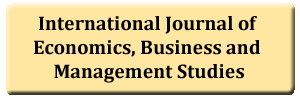Examining the Relationships between Perceived Usefulness, Perceived Ease of Use, Enjoyment and Self-Efficacy on Employees Behavioral Intention towards Adopting Online Technology Application at Workplace: A Case in Malaysia
DOI:
https://doi.org/10.20448/801.31.29.39Keywords:
Perceived usefulness, Perceived ease of use, Enjoyment, Computer self-efficacy, Behaviour intention.Abstract
Based on numerous past studies, there is a questionable issue of what really encourage employees from adopting a system in their daily work activities. This research objective is to identify the relationships between Perceived Usefulness, Perceived Ease of Use, Enjoyment and Computer Self-Efficacy towards Behavioural Intention to adopt online technology application among employees at a property developer company or known as PKNS, located in Klang Valley. A quantitative design is deployed in this research. A purposive sampling was used to collect data at the property developer premises. A total of 200 respondents were asked to rate questionnaire using 5 Likert-scale instruments. Findings show that Perceived Usefulness, Perceived Ease of Use, Enjoyment and Computer Self-Efficacy have a significant relationship towards the employees’ behavioural intention to use the online technology application at their workplace.




